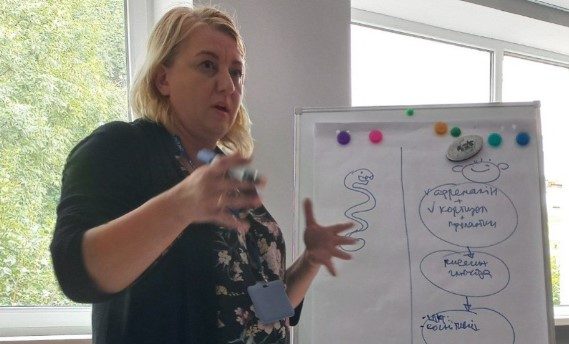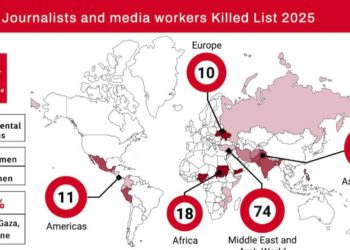The full-scale war has affected the psycho-emotional state of Ukrainians. It has not spared journalists because society imposes many demands and responsibilities on them: they must not be afraid, they must know everything, help everyone, not make mistakes, and work around the clock. With the beginning of the full-scale war, media workers have had an even greater workload, as well as problems related to survival, life and health of relatives, and lack of stability in life. Many colleagues complain of feelings of depression, hopelessness, constant fatigue, sleep problems, concentration problems, irritability, etc. Tetiana Bieliavtseva, a specialist at the Center for Resilience, a displaced journalist from the Kharkiv Region, who has conducted the second training on psychological support for colleagues, is helping media workers in Kolomyia cope with these problems.
“The first such training for media professionals, which was about finding an internal resource, was held by our Kolomyia Community organization together with the Ivano-Frankivsk Journalists’ Solidarity Center (JSC) of the National Union of Journalists of Ukraine (NUJU) at the end of July,” says the head of the journalism center/editor-in-chief of the Vilnyi Holos newspaper, Valentyna Blyzniuk. “Communicating with colleagues then, we realized how important the advice of a psychologist is for them; after all, even the hour spent is the second in the journalistic environment, in a circle of like-minded people. That is why our center decided to hold a cycle of such training sessions.”
During the second training, which was dedicated to preventing chronic stress, its participants received important knowledge and practical advice that will help avoid professional burnout and maintain mental health.
Tetiana Bieliavtseva focused on the types of stress: acute and chronic stress. Media professionals, in particular, learned what stress is useful and how to get out of stress qualitatively.
“This topic is very important,” the coach notes. “Because, according to the Ministry of Health, the psychological consequences of the war, including post-traumatic stress disorder, will affect our mental state for at least seven to ten years after the end of the war. We cannot live in constant stress because we cease to adequately cope with life’s challenges.”
It turns out that constant consumption of negative news is also dangerous for the psyche, we get stress from information. One of the recommendations of psychologist-media expert Tetiana Bieliavtseva is to regulate the perception of the information flow. That is, reduce it. Because there will always be news, we can only not immerse ourselves in it headlong.
Permanent stress is a marathon. In order to withstand it, you need to save your strength and have certain resources.
As for how to relieve constant stress, Tetiana Bieliavtseva advises standing by what you like. Such things can be sweets, sports, or a favorite job or hobby or charity.
Each of the training participants identified their positive and negative stress of the month, and together, they discussed the reasons and ways out of individual situations. Of course, it is impossible to protect yourself from life’s storms in advance. But when you understand what and why is happening to you, you are already halfway to overcoming the negative consequences. Evolution has programmed us for very high stress. The main thing is not to worry too much about taking care of yourself.
The training participants are grateful to the Center for Resilience and Tetiana Bieliavtseva for professional advice on strengthening mental health and developing personal potential. With each training, we become stronger and more confident in ourselves. The next training will take place at the end of September. Hence, the organizers invite all creative communities to an interesting conversation.
Call the Ivano-Frankivsk JSC at 066 677 0726 (Viktoriya Plakhta, the coordinator of the Ivano-Frankivsk Center). The Center is located at 25 Sichovykh Striltsiv Street.
About JSC
The Journalists’ Solidarity Centers are an initiative of the NUJU implemented with the support of the International and European Federations of Journalists, as well as UNESCO. The initiative is designed to help media representatives working in Ukraine during the war. The JSCs operate in Kyiv, Lviv, Ivano-Frankivsk, Chernivtsi, Zaporizhzhia, and Dnipro and provide journalists with organizational, technical, legal, psychological, and other types of assistance.
About UNESCO
UNESCO is the United Nations Educational, Scientific and Cultural Organization. It contributes to peace and security by promoting international cooperation in education, sciences, culture, communication, and information. UNESCO promotes knowledge sharing and the free flow of ideas to accelerate mutual understanding. It is the coordinator of the UN Action Plan on the Safety of Journalists and the Issue of Impunity, which aims to create a free and safe environment for journalists and media workers, thus strengthening peace, democracy, and sustainable development worldwide. UNESCO is working closely with its partner organizations in Ukraine to provide support to journalists on the ground.
The designations employed and the presentation of material throughout this digest do not imply the expression of any opinion whatsoever on the part of UNESCO concerning the legal status of any country, territory, city, or area or its authorities or concerning the delimitation of its frontiers or boundaries.
The authors are responsible for the choice and the presentation of the facts contained in this digest and for the opinions expressed therein, which are not necessarily those of UNESCO and do not commit the Organization.
Viktoriya Strilchuk

 THE NATIONAL UNION OF
JOURNALISTS OF UKRAINE
THE NATIONAL UNION OF
JOURNALISTS OF UKRAINE
















Discussion about this post